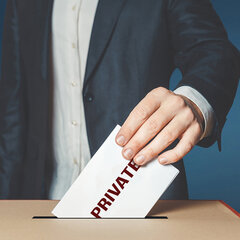
States that offer incentives need to take steps to ensure that all workers have the ability to make an informed and voluntary decision about unionization through a private ballot election. By passing private ballot protection laws, states protect workers and ensure their voices are heard.
Across the country, states have used economic incentives to compete for new business developments. Too often, these states fail to consider the potential risks that these developments pose to workers' rights. Some employers have agreed to "neutrality agreements" with unions, which require employers to recognize unions in new locations without holding a private ballot election and receiving an affirmative vote from their employees. Without laws requiring these private ballot elections, workers can face coercion or intimidation tactics.
There are two options when companies have a unionization effort. One is a private ballot vote where only each individual worker knows how he or she voted. However, unions prefer a second option – a process known as “card-check” – to organize employees. This card-check process entails collecting signatures – often done in full view of an employee’s coworkers, or even by repeated visits to their private homes to get a monopoly to represent all employees at a worksite and force an employer to negotiate with them. This often leads to intimidation, coercion and other pressure tactics.
While the federal labor law provides most private sector employers with two legal options for recognizing a union – either by the private ballot vote or by card-check – it does not mean the state has to subsidize both. That is because the state is entitled to make its own decisions about the sorts of companies it chooses to invest in, especially with state taxpayer dollars.
States that offer economic incentives should take steps to ensure that all workers can make an informed and voluntary decision about unionization through a private ballot election where no one else knows how each individual worker voted. By passing private ballot protection laws, states protect workers and ensure their voices are heard.
It’s encouraging that momentum is growing in states that value workers’ right to a private ballot election. These states believe in the right to vote freely and without coercion, and to have their votes fairly and impartially counted.
Workers for Opportunity worked to pass the first in the nation legislation in 2023 in Tennessee.
In 2024, two more southern states have followed Tennessee’s example by adopting very similar language that ties state taxpayer money used for economic incentives to ensure the right to a private or secret ballot election for any company that voluntarily receives taxpayer-funded incentives.
Georgia Gov. Brian Kemp signed legislation in April of 2024 and Alabama Gov. Kay Ivey signed legislation in May of 2024.
In the fall of 2023, the American Legislative Exchange Council adopted similar language as model legislation for all states to follow.
Workers for Opportunity expects other states around the country to take up similar legislation in current and future legislative sessions and we stand ready to help however we can.